

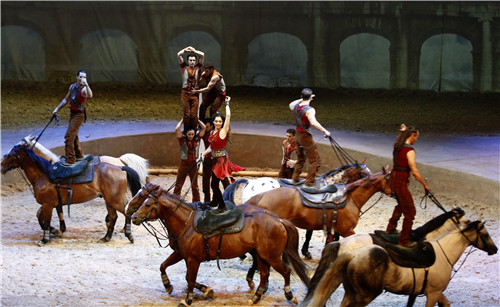
Canadian Dancing Horse Show Unveils Beijing Cultural Consumption Season. [Photo/Newsplusradio.cn]
The 4th Beijing People Beneficial Cultural Consumption Season is now taking place in the capital city. Insiders say as the city has witnessed a cultural consumption boom in recent years, there are huge space for the industry to grow.
Wang Lei has more.
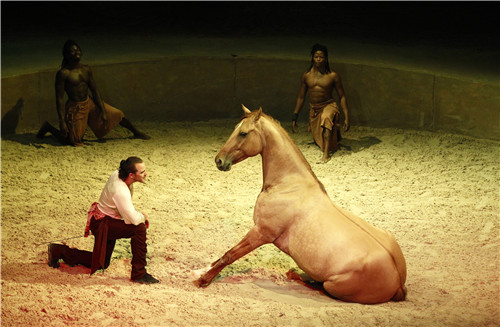
The "Cavalia Dancing Horse" show themes the encounter between man and nature. [Photo/Newsplusradio.cn]
Classic equestrian, horse galloping, high mountains, dense forest and river flows....sounds they all belong to the wilderness. But now, audiences can enjoy the magical encounter between man and horses in Beijing. On a summer night in the capital city's Chaoyang Park, more than 40 horses from eleven different breeds and 40 artists from Canada are leading a fabulous journey into a world of wild dreams.
During an interactive session before the show, many parents and children are being tested on their knowledge of horse and nature. With comprehensive arts performance, modern stagecraft and multimedia technology, the horses have enabled the audience to build bridges between cultures and expand civilization.
Mrs. Zhang is a mother of a 2-year-old boy.
"Today I'm here to experience it with my son. I have heard that this is a magic show. Also, I think dancing horses are worth watching, especially for children. And it's wonderful to spend the night watching a performance."
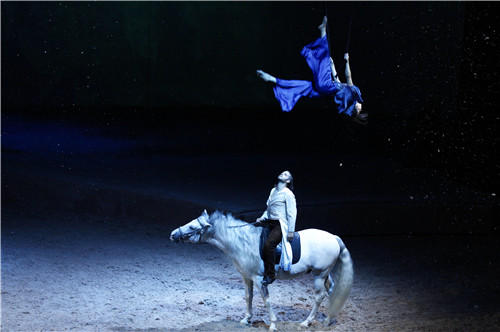
The "Cavalia Dancing Horse" show. [Photo/Newsplusradio.cn]
And this show, named "Cavalia Dancing Horse", is just the start of the countless cultural activities during the just opened 4th Beijing People Beneficial Cultural Consumption Season. The event, hosted by the municipal government, will highlight more than 100 low-price activities including cultural performances, film screenings, various exhibitions.
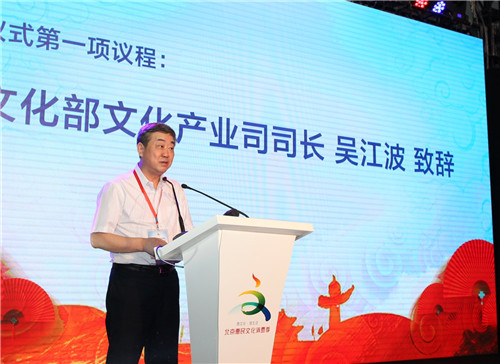
Wu Jiangbo, the director of the cultural industry department with the Ministry of Culture. [Photo/Newsplusradio.cn]
Wu Jiangbo is the director of the cultural industry department with the Ministry of Culture.
"In the last three years, the series of activities have created a favorable environment for stimulating cultural consumption, demonstrated the growing power of regional consumers and also promoted the capital's cultural industry development. This has provided a good references for other cities and regions."
Starting from 2013, the Beijing Cultural Consumption season has contributed a total spending of more than 26 billion yuan, or 4 billion US dollars. Director Wu Jiangbo says developing cultural consumption has already become a new economic growth point, especially under the pressure of an economic downturn.
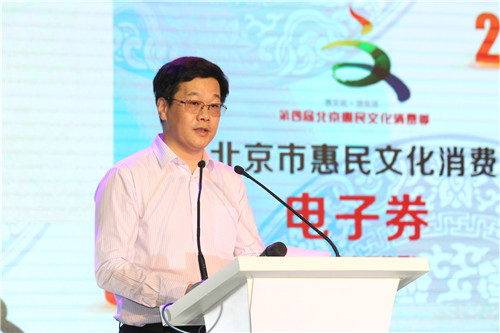
Zhou Maofei, director of the State-owned Cultural Assets Supervision and Administration Office of Beijing government. [Photo/Newsplusradio.cn]
Digital discount coupons worth a total of 10 million yuan will be provided to citizens through the "Beijing Wen Hui card" WeChat platform. Zhou Maofei, director of the State-owned Cultural Assets Supervision and Administration Office of Beijing government, says expanding cultural consumption is necessary and feasible.
"We are providing more cultural products and services to our citizens. Last year, the annual cultural and entertainment consumption had increased by 12.4 percent, far beyond the consumption growth of other sectors."
Statistics show that in 2015, the added value of cultural and creative industry accounts for 13% in the local GDP, indicating that the sector has already become the second largest pillar industry after finance.
Feng Jinming is the publicity manager of Mei Lanfang Grand Theatre in Beijing. He says the boom of cultural consumption brings vigour to traditional arts.
"Before, most of the audience who came to our theater are elder people. But, in recent years, there are more young people starting to enjoy Peking Opera. It is attracting both young performers and audiences. This is a good thing for promoting our traditional culture."
While preserving traditional arts has been high on the Chinese government's agenda, government officials and art patrons like Zhou Maofei says as cultural consumption rapidly grows, developing arts centers are playing a more important role in the future of city planning.
"A unique feature of Beijing is that while many traditional forms of culture are getting revitalized, various new cultural industries have also escalated. As an international metropolis, Beijing is the national cultural and arts center. Therefore, it's especially important to develop cultural industrial parks and arts centers, to encourage more domestic cultural products and engaging more people in arts and cultural events. This will play a key role in improving the quality of the city."
This year's Beijing Cultural Consumption Season will run until November.